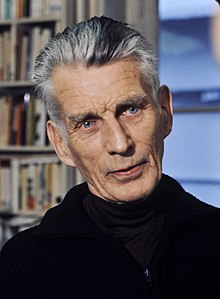Samuel Beckett
Samuel Beckett | |
|---|---|
 Beckett in 1977 | |
| Born | Samuel Barclay Beckett 13 April 1906 Foxrock, Dublin, Ireland |
| Died | 22 December 1989 (aged 83) Paris, France |
| Occupation | Novelist, playwright, poet, theatre director, essayist, literary translator |
| Nationality | Irish |
| Alma mater | Trinity College Dublin |
| Genre | Drama, fiction, poetry, screenplays, personal correspondence[1] |
| Notable works | Murphy (1938) Molloy (1951) Malone Dies (1951) The Unnamable (1953) Waiting for Godot (1953) Watt (1953) Endgame (1957) Krapp's Last Tape (1958) How It Is (1960) Happy Days (play) (1960) |
| Notable awards | Nobel Prize in Literature 1969 Croix de Guerre 1945 |
| Years active | 1929–1989 |
| Spouse | Suzanne Dechevaux-Dumesnil (1961–1989; her death) |
| Signature | |
Samuel Barclay Beckett (/ˈbɛkɪt/; 13 April 1906 – 22 December 1989) was an Irish writer. He was born in Dublin, Ireland. Becket wrote novels, plays and poetry. He also translated other famous works of literature. He was given the Nobel Prize for Literature in 1969.[2]
His best-known play is Waiting For Godot. It has often been acted on stage and on TV.
Beckett was stabbed in Paris in 1938.[3]
He died of breathing problems in Paris in 1989.[4]
Many writers of plays (playwrights) and others think he is one of the most important writers of the 20th century.[5] There have been many books written about him.
His books are often about people going through hard times and seeing life as both sad and funny.
Works[change | change source]
Theatre
- Human Wishes (c. 1936; published 1984)
- Eleutheria (written 1947 in French; published in French 1995, and English 1996)
- En attendant Godot (published 1952, performed 1953) (Waiting for Godot, pub. 1954, perf. 1955)[6]
- Acte sans Paroles I (1956); Act Without Words I (1957)
- Acte sans Paroles II (1956); Act Without Words II (1957)
- Fin de partie (published 1957); Endgame (published 1957)
- Krapp's Last Tape (first performed 1958)
- Fragment de théâtre I (late 1950s); Rough for Theatre I
- Fragment de théâtre II (late 1950s); Rough for Theatre II
- Happy Days (first performed 1961); Oh les beaux jours (published 1963)
- Play (performed in German, as Spiel, 1963; English version 1964)
- Come and Go (first performed in German, then English, 1966)
- Breath (first performed 1969)
- Not I (first performed 1972)
- That Time (first performed 1976)
- Footfalls (first performed 1976)
- Neither (1977) (An "opera", music by Morton Feldman)
- A Piece of Monologue (first performed 1979)
- Rockaby (first performed 1981)
- Ohio Impromptu (first performed 1981)
- Catastrophe (Catastrophe et autres dramatiques, first performed 1982)
- What Where (first performed 1983)
Radio
- All That Fall (broadcast 1957)
- From an Abandoned Work (broadcast 1957)
- Embers (broadcast 1959)
- Rough for Radio I (published 1976) (written in French in 1961 as Esquisse radiophonique)
- Rough for Radio II (published 1976) (written in French in 1961 as Pochade radiophonique)
- Words and Music (broadcast 1962)
- Cascando (broadcast:1963 French version; 1964 English translation)
Television
- Eh Joe with Jack MacGowran (broadcast 1966)[7]
- Beginning To End with Jack MacGowran (1965)
- Ghost Trio (broadcast 1977)
- ... but the clouds ... (broadcast 1977)
- Quad I + II (broadcast 1981)
- Nacht und Träume (broadcast 1983); Night and Dreams, published 1984
- Beckett Directs Beckett (1988–92)
Cinema
- Film (1965)
References[change | change source]
- ↑ Muldoon, Paul (12 December 2014). "The Letters and Poems of Samuel Beckett". The New York Times. Retrieved 13 December 2014.
- ↑ "Beckett, Samuel". Oxford Reference - The Oxford Companion to English Literature. 2009. Retrieved January 31, 2023.
- ↑ "When Samuel Beckett was stabbed by a pimp". Time News. 2022-08-13. Retrieved 2023-01-31.
- ↑ Gussow, Mel (1989-12-27). "Samuel Beckett Is Dead at 83; His 'Godot' Changed Theater". The New York Times. ISSN 0362-4331. Retrieved 2023-01-31.
- ↑ "Samuel Beckett". Poetry Foundation. 2023-01-30. Retrieved 2023-01-31.
- ↑ "Playwrights and their stage works". 4-wall.com. Retrieved 17 March 2014.
- ↑ A German version He Joe was broadcast first in 1966. Knowlson, J., Damned to Fame: The Life of Samuel Beckett (London: Bloomsbury, 1996), p 535
